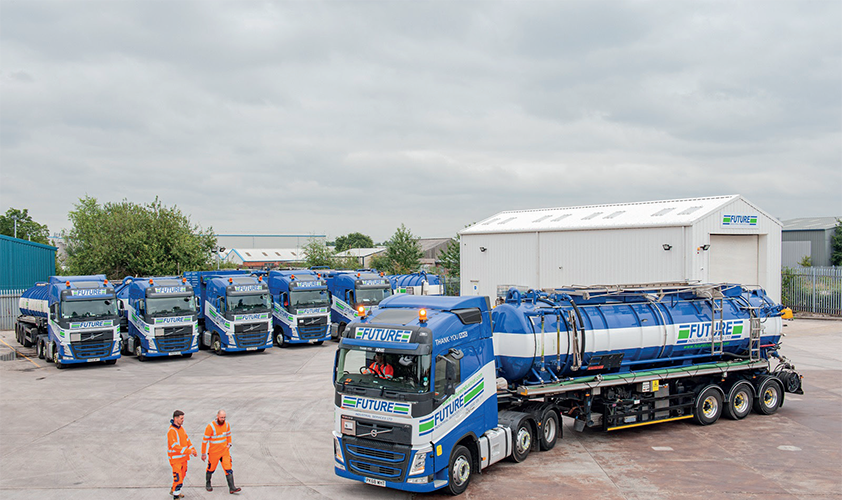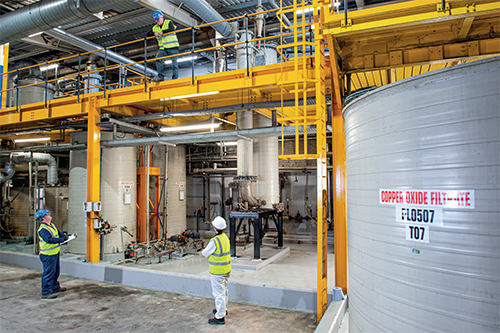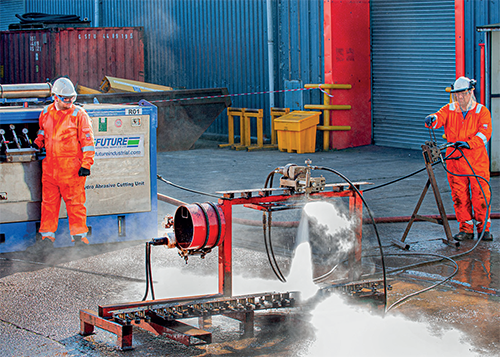
Future Industrial Services
A reliable partner
Future Industrial Services is an award-winning provider of essential and complex environmental services across the fast-growing industrial markets
Future Industrial Services (FIS) was founded in 1999, in order to provide hazardous waste management and specialized industrial services to meet the requirements of Government, local authorities, public utilities, and national and multi-national companies. Acquired by Management and NorthEdge Capital Private Equity in 2017, the company provides services on a national scale from a series of well-invested and strategically located sites across the UK, from Berwick-upon-Tweed in the North East of England, to Devonport in the South West, and boasts approximately 275 employees.
“Our business activities are focused on several key market sectors, including oil and gas, advanced manufacturing, new energy, and utilities,” explains David Lusher, CEO at FIS. “A key pillar of that is our UK-wide support for oil refineries, storage facilities, gas terminals, and the offshore sector. We provide specialist shutdown and cleaning services for energy recovery facilities (ERF), biomass, and gasification plants, as well as planned shutdown services and emergency support.”
One significant contract for FIS has been its long-running relationship with the P66 Humber Refinery, located in South Killingholme, North Lincolnshire. Recently extended for another three years, reinforcing the company’s ability to deliver integrated cleaning and waste processing services in challenging and hazardous environments.
“Our relationship with P66 stretches back more than a decade, and we are pleased to announce that our contract for tank cleaning services has been renewed,” says Jon Callaghan, Director of Specialist Industrial Services at FIS. “Our success in operating in the oil refining, and petrochemical sectors as well as offshore, is associated with our commitment to the highest standards of safety management, detailed planning and execution. To achieve that, we are supported by significant investments in new technology, including ATEX standard category 1 equipment, which enables us to clean tanks and vessels with a zone zero internal atmosphere.”
A second area of expertise for FIS is its extensive environmental services, a crucial element of which is the company’s seven-acre site at Berwick, home to the UK’s largest mercury recovery plant. “Our Berwick facility provides the industry with a thermal treatment and recovery solution for problematic waste,” David explains. “The plant typically receives approximately 600 tons of mercury-contaminated material for processing and treatment per annum. It has a typical recovery rate of 99.99 percent, with the recovered material then returned to the customer or reused by industry.”
FIS is also pushing the envelope when it comes to advancing new technologies. The company’s recent acquisition of a thermal rotary unit is set to be a game-changer, reducing the water content of waste material in order to concentrate metal contaminants, and thereby aid the recovery process. “With a throughput of one ton per hour, and a temperature of 150-degrees- Celsius at eight bar-pressure, the process is capable of conditioning filter cake to enable safe and secure forward logistics,” David reveals. “It’s an innovative solution, and one that gives a ‘second life’ to problematic material that would normally be disposed of via landfill.”
As recently as January 2022, FIS announced that it had completed the expansion of its hazardous treatment recovery facility in Honiton, the result of a £1.2m investment. “The major improvement and expansion of the FIS hazardous waste recovery facility in Honiton provides pivotal infrastructure to the Southwest,” David continues. “Our early adoption of new industry standards has required the provision of bespoke drainage systems, state-of-the-art fire prevention and suppression systems, advanced CCTV security, and the construction of 24 new bays, allowing for the necessary segregation of different EWC code materials. This expansion now sees our capacity increase to over 800 acceptable waste codes.”
Recognizing the rapid growth and development of the EV market and the need to simplify and co-locate supply chains in the UK, FIS has spent the last 12 months developing sustainable recycling and recovery processes, with the aim of fully embracing circular economy principles. “Placing value on reusing, repurposing, and recycling resources is key to UN Sustainability Development Goal (SDG) 12, and the circular economy is designed to benefit businesses, society, and the environment,” David comments. “For the hazardous waste industry, the FIS Honiton site plays a regionally significant role in helping to prevent the depletion of vital and non-renewable natural resources.”
To a similar end, FIS has been working in close partnership with a leading UK manufacturer of rigid and flexible printed circuit boards, and a key supplier to the EV market. “Adopting a circular economy approach, we will collect the existing physical post-process material from the manufacturer, before removing the ferric and the contaminants by advanced separation and  filtration,” David explains. “That will be used to generate a fresh ferric chloride solution, which is returned to the customer for reuse. The recovered nickel is then manufactured into an intermediatory product, which is supplied to industrial customers engaged in catalyst ceramics and electrical component manufacturing.
filtration,” David explains. “That will be used to generate a fresh ferric chloride solution, which is returned to the customer for reuse. The recovered nickel is then manufactured into an intermediatory product, which is supplied to industrial customers engaged in catalyst ceramics and electrical component manufacturing.
“FIS is also committed to Net Zero carbon, and we have moved to electric forklift trucks and Euro 6 fuel efficient vehicles,” he adds. “By switching to a new electricity supply on a Net Zero carbon tariff we have significantly reduced our net CO2 emissions, further enhancing our SDG performance.”
As with any business operating within the oil and gas sector, safety is of the utmost concern to FIS. In this, technological advancements are once again helping the company to deliver best practice. “We have made major investments in ‘no-man entry’ robot solutions, primarily for tank cleaning services,” David reveals. “Thanks to our remotely operated vehicle (ROV), we have been able to eliminate the requirement for our operatives to enter confined spaces and potentially dangerous environments. This continues to expand our assets within our no man entry market offering.”
These solutions are already being put to good use. “We recently developed an inline processing system including cannon washes, filter presses, and centrifuges to empty a large tank containing an estimated 1000 m3 of sludge, without man entry,” David notes. “Thanks to this innovative solution, we were able to put health and safety at the forefront. Likewise, by processing and treating the waste on-site, this reduced the amount of material disposed, eliminated the need for transportation, and facilitated the reuse of filtered water.”
While the company remains a specialist in delivering bespoke complex solutions to refineries and industry sectors across the UK, FIS is also exploring new avenues, notably within the UK’s burgeoning renewables sector. “With the increase in renewable-energy technologies, FIS has become a market leader in large outage industrial cleaning services within the energy sector,” David tells us. “Over the last 12 months, national recycling and renewable energy companies have secured the services of FIS on long term contracts, trusting in our expertise and experience to ensure that the downtime of their plants is minimized.”
Moving into 2022, David believes the company is in good shape, with a clear ambition to develop its activities and services within key markets. “With a supporting shareholder backing management, capital has been approved to support operations with new assets and equipment,” David explains. “That includes robotic no-man entry technology, DISAB vacuumation machines, Jetvac utility trucks, and significant plant upgrades to all permitted waste treatment facilities.
“We will continue to differentiate by offering technical solutions to challenging projects, with a continued focus on quality, QHSE, and training,” he concludes. “We believe that the onshoring of manufacturing post-Brexit represents a real opportunity to support SDG-aligned customers in their own growth programs. In that, FIS is a credible and trusted partner.”
Future Industrial Services
https://futureindustrial.com
Services: Specialist industrial and environmental services